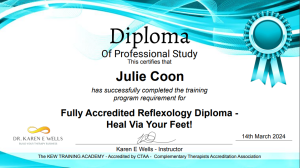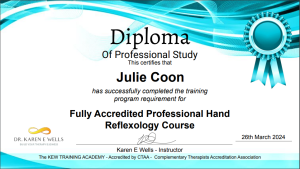What does a reflexology do?
Reflexology is a type of therapy that uses gentle pressure on specific points along your feet (and on your hands) to help you feel better. The theory is that this eases stress, and that helps your body work better. It’s also known as zone therapy. A session includes lying on a comfortable massage table, soft music playing in the background, light essential oils adding a relaxing aroma to the session, warmed towels wrapping your tired hands or feet in pure bliss, and a soothing oil being gently massaged in for an ultimate state of relaxation. I am here for your safety and comfort.
Reflexology Can Minimize the Symptoms Associated with:
- Stress.
- Tension or migraine headaches.
- Arthritis.
- Menopause.
- Infertility.
- Menstrual pain.
- Back pain.
Can reflexology have side effects?
Generally, reflexology appears to be safe and doesn’t cause many side effects. Because most people feel relaxed after a treatment you might feel a bit lightheaded. Some people say their feet feel tender afterwards, others can have an emotional response or need to pass urine more often.
When should you not do reflexology?
Patients with foot fractures, unhealed wounds, or active gout in the foot should avoid reflexology. Patients with osteoarthritis that impacts the foot or ankle, wrists or hand joints, or those with vascular disease of the legs or feet, should consult with their primary provider prior to beginning reflexology on the feet. Also, anyone under the influence of narcotics or alcohol, contagious skin or nail disease, lymphoma, leukemia, fever, vomiting, diarrhea, hematoma, sunburn, or severe eczema of the foot and hands, anyone in their first or third trimester of pregnancy, and anyone with diabetic neuropathy should avoid a reflexology session.
Contact me if you have any questions regarding a reflexology session.
I look forward to serving you in your quest for your deep relaxation needs!


